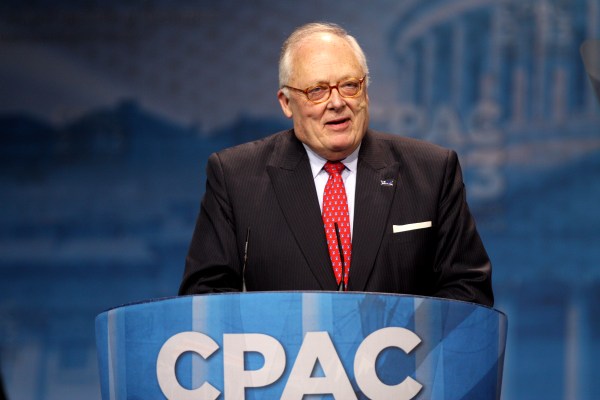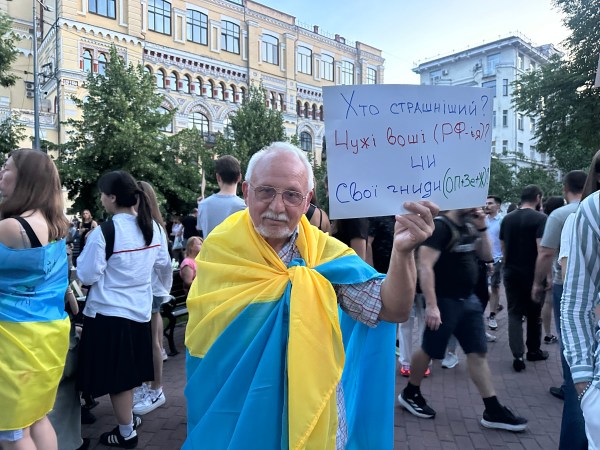Happy Monday! We cannot adequately capture in just a few sentences how great it was to have college football back on our TVs this weekend.
Quick Hits: Today’s Top Stories
- Speaking at the Kansas City Fed’s annual symposium in Jackson Hole, Wyoming, last week, Federal Reserve Chair Jerome Powell suggested that additional interest-rate hikes could be necessary later this year. Noting that inflation remains “too high,” Powell made clear the Fed is prepared to raise rates further “if appropriate,” and that the central bankers intend to “hold policy at a restrictive level” until they are “confident that inflation is moving sustainably down.” Investors are currently pricing in about a 20 percent chance the Fed hikes rates by 25 basis points at its next meeting in late September, and an 80 percent chance it holds steady.
- The Bureau of Labor Statistics issued a preliminary benchmark revision of its employment numbers last week, revising the total number of jobs added in the year ending March 2023 down by 306,000. Hiring remained robust for the year despite the revisions—the updated figures only reduced total employment by 0.2 percent—but the data indicate the economy is not running quite as hot as previously believed. The transportation, warehousing, and professional/business services sectors accounted for most of the downward revisions.
- A 21-year-old gunman shot and killed three people at a Dollar General store in Jacksonville, Florida, on Saturday before dying of a self-inflicted gunshot wound. The gunman—who was white—reportedly left behind three racist manifestos, leading law enforcement officials to classify the shooting as racially motivated. Jacksonville Sheriff T.K. Waters told reporters the shooter “hated black people,” and Attorney General Merrick Garland said Sunday the Justice Department will investigate the shooting as a hate crime. The shooter had no previous criminal record and had legally obtained the two firearms—a Glock pistol and an AR-15 rifle with white swastikas drawn on it—used in the shooting. Gov. Ron DeSantis put his presidential campaign on hold Sunday, returning to Florida to attend a vigil for the shooting victims and prepare for Idalia, a storm that is expected to make landfall along the Gulf Coast as a hurricane later this week.
- At least seven confirmed tornadoes swept through southeastern Michigan late last week, resulting in at least five deaths and hundreds of thousands of people without power. The severe weather toppled trees and downed power lines across the region.
- A U.S. Marine pilot died on Friday after his F/A-18 Hornet jet crashed late Thursday night during a training flight in Miramar, California, near San Diego. The cause of the crash is still unknown and an investigation is ongoing. Three more Marines died in Australia on Sunday when an Osprey aircraft carrying a total of 23 Marines crashed during a training exercise. The cause of that crash—which injured several others—is also under investigation.
- Federal prosecutors are considering charges against Democratic Sen. Bob Menendez of New Jersey after a years-long investigation into possible corruption, the Wall Street Journal reported Friday. The U.S. Attorney’s office for the Southern District of New York will likely meet with Menendez’s lawyers in the coming weeks as they decide whether to bring charges related to gifts the senator allegedly received in exchange for political favors. Menendez was previously indicted in 2015 for allegedly exchanging political favors for luxury gifts, but the trial concluded in a mistrial in 2017 after a deadlocked jury failed to reach a verdict.
- President Joe Biden said Friday the special counsel investigating his handling of classified documents has thus far not requested an interview. “There’s no such request and no such interest,” he told reporters. Attorney General Merrick Garland appointed Robert Hur back in January to probe whether Biden broke any laws after classified documents were found at both Biden’s Delaware home and an office he used in Washington, D.C.
- In an effort to remove the case to federal court, three Georgia Republicans who are co-defendants with former President Donald Trump in Fulton County DA Fani Willis’ case involving efforts to overturn the 2020 election in the state wrote in a series of court filings last week that they only participated in the alleged fraudulent electors scheme because the former president and his campaign told them to, leading them to believe they had the federal government’s approval for their actions.
- The 2028 GOP nominating convention will be held in Houston, Texas, the Republican National Committee (RNC) announced Friday. The RNC took the unprecedented step of announcing the 2028 convention a year before the next one—set to take place in Milwaukee, Wisconsin—had even occurred, as part of their plan to begin selecting convention locations six years in advance.
- Charlie Gerow, the vice chair of the Conservative Political Action Coalition (CPAC), resigned Friday after nearly two decades with the organization. Gerow is reportedly the fifth CPAC board member to step down in recent months, after Matt Schlapp, the chair of CPAC’s parent organization, was sued earlier this year over allegations of sexual assault that Schlapp denies. In announcing his resignation, Gerow urged the board to authorize an investigation into both Schlapp’s conduct as well as CPAC’s finances. “The situation at CPAC has become such that I felt compelled to resign,” Gerow told Politico.
- French Education Minister Gabriel Attal announced Sunday France will no longer allow students to wear the abaya, a Muslim religious covering for women, in public schools, arguing the religious dress runs counter to the French law requiring secularism. The rule adds to the growing number of religious symbols, like the kippah and hijab, explicitly banned in public schools and will go into effect as soon as the new school year starts on September 4.
- Bob Barker, the longtime host of The Price is Right, died on Saturday at the age of 99. Barker—an avowed animal rights activist—hosted the popular game show from 1972 to 2007.
Yevgeny Prigozhin, 1961-2023

For the average American, the odds of dying in a plane crash in any given year are about one in 11 million. We don’t have data specifically for Russian warlords-turned-mutineers, but we have to imagine the odds are a little higher. Just ask Yevgeny Prigozhin, who appears to have been killed last week when a private aircraft he was supposedly aboard went down.
It wasn’t the first time. In October 2019, Prigozhin—the head of Wagner Group, the private military company—was reportedly on a jet that crashed in the Democratic Republic of Congo. Within days, however, it became clear that reports of his death were greatly exaggerated. A source close to Prigozhin apparently told Russian state media at the time that he was “very surprised to be considered dead.”
Such a resurrection seems less likely this time around. On Wednesday—exactly two months after Prigozhin launched his abortive putsch against top Russian military brass—a private plane with his name on the passenger manifest crashed halfway between Moscow and Prigozhin’s hometown of St. Petersburg. The crash apparently killed all ten people aboard—including Prigozhin and his lieutenant, Dmitri Utkin—and evidence is mounting to suggest the warlord is, in fact, dead. The cause of the crash is still shrouded in mystery, and questions abound regarding what this death means for the future of Prigozhin’s sprawling mercenary enterprise, for its activities across the globe, and for Russian President Vladimir Putin’s grip on power.
Prigozhin fate—and Wagner’s—has been up in the air since Belarusian President Alexander Lukashenko brokered a deal between Prigozhin and Putin in June to call off the former’s mutiny. The mercenary forces that had effectively taken the city of Bakhmut—one of Russia’s few decisive victories since the beginning of the invasion—retreated from the battlefield, with many removing to Belarus. Keeping track of Prigozhin himself over the last two months was like playing warlord whack-a-mole, as he popped up in Belarus only to be spotted in Russia—the day before the flight went down, he seemed to be in Africa.
Then, the world heard he was on a plane that fell out of the sky. Eyewitness video recorded Wednesday in the Tver region, northwest of Moscow, showed a small jet in free-fall, missing one wing and trailing thick, black smoke, ultimately landing in a field. Reporting from Reuters suggested the plane had gone on and off of radar and taken some wild altitude swings immediately prior to crashing.
Even before much was known about the crash itself, U.S. President Joe Biden said what we were all thinking. “I don’t know for a fact what happened, but I’m not surprised,” he told reporters Wednesday in Lake Tahoe, California, where he was vacationing. “There’s not much that happens in Russia that Putin’s not behind. But I don’t know enough to know the answer.”
Before formally pointing the finger at Putin, however, Western officials wanted to determine Prigozhin was really dead. “Our initial assessment is that it’s likely Prigozhin was killed,” Defense Department spokesperson Pat Ryder said Thursday, clarifying that he meant that he had died in the crash, not “was assassinated.” Over the weekend, Russian officials backed up that assertion, claiming they had matched Prigozhin’s DNA to evidence found at the crash.
Preliminary intelligence reports from the U.S. and its allies seemed to confirm Biden’s early suspicion: The plane crash was no accident, and Putin was probably behind it. Ryder on Thursday batted down the earliest reports—and eyewitness accounts—suggesting the plane had been shot down by a surface-to-air missile, but declined to elaborate on any alternative theories. The New York Times cited Pentagon officials who suggested that an explosion on the plane—either from a planted bomb or sabotage of the engine—caused the crash.
Those officials also pointed the finger more decisively at Putin, highlighting several interesting coincidences that suggested the Russian president’s involvement. The date—exactly two months to the day after Prigozhin sent his men marching toward Moscow in a bold and ultimately short-lived attempt to oust key generals in charge of the Russian war effort in Ukraine—was potentially symbolic for a leader humiliated by his wishy-washy response to the unprecedented mutiny by his onetime ally and caterer. On the same day as the crash, Putin ousted General Sergei Surovikin—considered friendly to Prigozhin and one of the architects of Russia’s defensive strategy in Ukraine—as head of the country’s aerospace forces.
Putin also has a well-established track record of trying to off his enemies—and perhaps no one had as complicated a relationship with the Russian leader as Prigozhin. Prior to any confirmation of his death, Putin acknowledged the crash and referred to Prigozhin in the past tense. “This was a person with a complicated fate,” he said, sending his condolences to the warlord’s family. “He made some serious mistakes in life, but he also achieved necessary results.”
The Kremlin has, naturally, denied any involvement. “Right now, of course, there are lots of speculations around this plane crash and the tragic deaths of the passengers of the plane, including Yevgeny Prigozhin,” Kremlin spokesman Dmitry Peskov said Friday, seeming to refer to allegations Putin ordered Prigozhin’s death. “Of course, in the West those speculations are put out under a certain angle, and all of it is a complete lie.”
As Russian authorities continue their investigation into the cause of the crash—the results of which may never be released—conspiracy theories abound. There is speculation online that Prigozhin is still alive, fueled by early claims a second Wagner-owned plane was in the sky Wednesday. Others associated with Wagner immediately suggested it was a murder, but didn’t explicitly name the Russian government as the assassins. Still others, mostly aligned with the Kremlin, have blamed the pilot, some sort of mechanical malfunction, or a terrorist attack, Kateryna Stepanenko—a Russia analyst at the Institute for the Study of War who tracks the Russian information space and other sources of open source intelligence—tells TMD.
She notes that the confusion in Russian state and social media and the proliferation of competing theories is no accident. “It’s by design that it’s all so up-in-the-air and confusing,” she says. “That helps the Kremlin deflect the blame and orient people on focusing on something like these minor technical nuances [of the plane crash] rather than the fact that the Kremlin just eliminated someone that Putin thought betrayed him with this rebellion.”
Not for the first time this year, Wagner’s future is uncertain. Prigozhin’s private military organization is more than just a group of warfighters. It’s also “a global network of shell companies,” Colin Clarke, director of research at the Soufan Group and a senior fellow at the Foreign Policy Research Institute, tells TMD. “It’s the primary tool that the Russians are using to evade sanctions at the moment.” Wagner’s work in Africa—where it provides security to juntas and governments and engages in shoot-first-ask-questions-later counterterrorism operations in exchange for access to resources—is essentially an arm of Kremlin foreign policy in the turbulent Sahel region.
It’s unclear whether that work will cease altogether or continue under a reconstituted Wagner or a new private military company—of which Russia has plenty, though none so extensive as Prigozhin’s. “I don’t think there’s an organization that can just kind of take over Wagner in its entirety,” Christopher Faulkner, an assistant professor of national security affairs at the U.S. Naval War College, tells TMD—speaking in a personal capacity and not on behalf of his employer. “I think [Putin and the Russian military elite] are going to figure out a way to salvage what’s salvageable and then what’s not salvageable, use some of the infrastructure that they’re cultivating and other private military companies to replace it.” On Friday, Putin issued an order requiring Wagner fighters to sign an oath to “pledge allegiance to the country and military.”
However, there’s an unknowable number of Wagner mercenaries potentially more loyal to Prigozhin and Utkin, his second-in-command who led the fighting force, than to their paycheck or Putin. If the idea that Prigozhin was assassinated takes root, it could make maintaining Wagner’s presence as a Russian proxy more difficult. “There is potential for disruption of Russia’s activities because if there’s some real discord in the ranks it’s going to hinder operations globally,” Clarke says. “I think that’s what they’re probably most concerned about now, ‘How do we keep this as a well oiled machine in Africa, in the Middle East, and elsewhere?’”
Worth Your Time
- While old electric lines downed by high winds may have provided the spark that started the deadly blazes in Maui this month, invasive grass provided the kindling—and the risk posed by the grasslands was no secret. “For years, local fire officials worried about the blanket of invasive grasslands overtaking the abandoned sugar plantations above Hawaii’s ancestral capital,” a Wall Street Journal investigative team writes. “The buildup of vegetation around Lahaina helped lead to ‘catastrophic fire spread,’ according to a preliminary analysis by the Insurance Institute for Business and Home Safety, an industry research group. There were few rules on managing the vegetation. And the large landowners that now control much of the area—including the state of Hawaii, a major educational foundation and a prolific local developer—had few incentives to mitigate the hazard. County data, property records, and topographical analysis provided to the Journal by University of Hawaii researchers show just how overrun the region around Lahaina was with the dangerous grasses and how little authorities did about it. Report after report over nearly a decade warned state and Maui County officials that the grasses—which are up to 10 times as dense as those commonly found on the mainland—were bound to cause more fires.”
Come On Down!
Presented Without Comment
Reason: “A new study from Belgian researchers found that paper straws had higher concentrations of long-lasting, water resistant ‘forever chemicals’ than plastic or steel straws.”
Also Presented Without Comment
New York Post: ‘Rich Men North of Richmond’ Singer Oliver Anthony Slams Republicans for Song Use at Debate
“It was funny seeing my song at that presidential debate because I wrote that song about those people, you know, so for them to have to sit there and listen to that, that cracks me up.”
Also Also Presented Without Comment
Wall Street Journal: A Sperm Donor Chases a Role in the Lives of the 96 Children He Fathered
Toeing the Company Line
- In the newsletters: The Dispatch Politics crew reports on Nikki Haley’s post-debate bump, Chris explains why (🔒) a return to COVID-19 hypervigilance would be bad for Democrats, Jonah explains a weird trick that helps him identify real-world protagonists, Nick digs into (🔒) whether the ramifications of Trump’s indictments are worth it, and Price covers House Republicans’ efforts to get to the bottom of Biden’s email pseudonyms.
- On the podcasts: Jonah discusses how rodentology can help us understand last week’s debate and Mary is joined on the Dispatch Podcast by Michael Beckley, an associate professor of political science at Tufts University, to discuss the geopolitics around Biden’s recent Camp David summit with Japanese and South Korean leaders.
- On the site over the weekend: Michael reviews Russell Moore’s book, Losing our Religion, and John Wood Jr. reflects on Martin Luther King, Jr.’s teachings on character on the 60th anniversary of the March on Washington.
- On the site today: Harvest explains the Trump campaign’s latest immigration proposals and Drucker reports on the GOP candidates’ back-and-forth on Donald Trump.
Let Us Know
Do you think Putin is in a stronger or weaker position within Russia than he was last week?







Please note that we at The Dispatch hold ourselves, our work, and our commenters to a higher standard than other places on the internet. We welcome comments that foster genuine debate or discussion—including comments critical of us or our work—but responses that include ad hominem attacks on fellow Dispatch members or are intended to stoke fear and anger may be moderated.
With your membership, you only have the ability to comment on The Morning Dispatch articles. Consider upgrading to join the conversation everywhere.